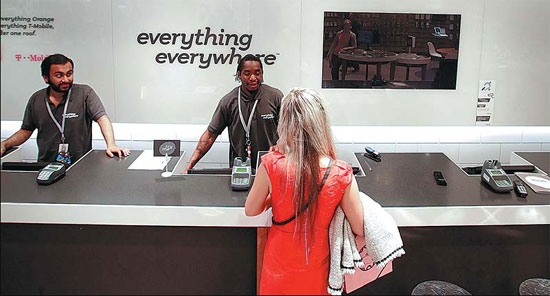UK ‘welcomes’ Chinese capital
16 January 2013
The British Ambassador to China told an audience in Beijing on Friday that his government continues to welcome investment from China.
 |
|
A customer makes a purchase in an Everything Everywhere Ltd store at Westfield Stratford City mall in London. The UK’s largest telecoms operator announced on Wednesday that its network infrastructure and solutions will all be supplied by Chinese telecom giant Huawei Technologies Co, when it launches commercial operations of its 4G service. Jason Alden / Bloomberg |
Sebastian Wood told the FT Chinese Annual Forum 2012 that the United Kingdom wants to lift its economy out of the global financial crisis by seeking investment-driven growth, rather than one led by domestic consumption.
“This strategy is the opposite to that of China, because we have spent too much,” Wood said.
The comments came just 24 hours after it was revealed that China Investment Corporation, the sovereign wealth fund, had increased its investment in the infrastructure of the UK by spending 450 million pounds ($726 million) on a 10 percent stake in the company that owns London Heathrow Airport, the country’s largest airport.
It was the second major investment made by CIC this year in the UK infrastructure sector, after the manager of China’s $410 billion wealth fund took an 8.86 percent stake in Thames Water, the largest water and sewage company in the UK, in January – a deal considered by analysts at the time as the fund’s first major share purchase in the UK.
Reporting the Heathrow deal this week, The Financial Times suggested that CIC is in talks to buy Deutsche Bank’s UK headquarters for 250 million pounds.
Chinese investment in the UK has gone beyond infrastructure.
In September, Chinese telecom and computer network giant Huawei Technologies Co invested 1.3 billion pound to expand its operations in Britain over the next five years, a move which is expected to create 500 jobs.
The world’s second-largest telecom equipment vendor has been a big supplier in the UK since it entered the market through a deal with British Telecommunication Plc in 2004.
Wood said that China is becoming more open to invest in technological areas overseas, adding “we welcome the investment from China”.
According to the latest figures from UK Trade & Investment, which promotes UK business deals overseas, China became the third-largest investor in the UK in 2011, up from seventh the year before, thanks to the Chinese government’s policy of encouraging competitive companies to expand abroad.
Last year, China’s investment in the UK surpassed $1.1 billion, an increase of more than 55 percent year-on-year.
Justin Yifu Lin, a former chief economist at the World Bank, told the FT Forum that infrastructure investment is becoming a key engine for economic growth in developed economies.
“Although developed nations have mature infrastructure networks, there is still big investment potential in the area,” Lin said.
The Council of Europe estimates that countries across the continent will invest $2.8 trillion in infrastructure over the next 10 years.
UKTI says that the country has identified 250 billion pounds worth of infrastructure investment needed over the next 10 years, with increased private-sector involvement needed to deliver that, on projects including energy generation and transmission, airports, rail, digital communications, and waste and water treatment.
The UK government’s attitude differs from that in the US, where the authorities have expressed national security concerns over Huawei’s investment plans in the country.
FT quoted a spokesman for British Prime Minister David Cameron as saying: “The 500 jobs brought by Huawei are the kind of jobs we need to rebalance the economy and compete in the global race.”
The UK’s largest telecom operator Everything Everywhere announced on Wednesday that its network infrastructure and solutions will all be supplied by Huawei, when it launches commercial operation of its 4G service.

Recent Comments